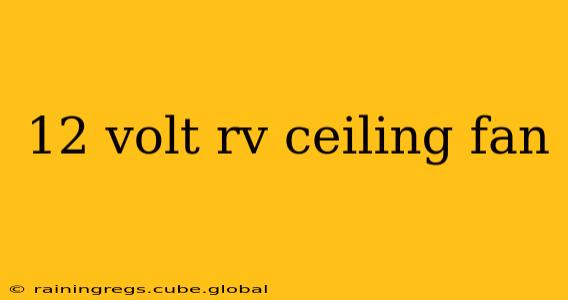Finding the right 12-volt RV ceiling fan can significantly enhance your camping experience, providing comfort and a more pleasant atmosphere. However, navigating the options can be challenging. This guide dives deep into everything you need to know about choosing and installing a 12-volt RV ceiling fan, addressing common questions and concerns.
What are the benefits of a 12-volt RV ceiling fan?
12-volt RV ceiling fans offer several advantages over their 120-volt counterparts. Firstly, they're designed for lower voltage systems commonly found in RVs, eliminating the need for voltage converters or complex wiring modifications. This simplifies installation and reduces the risk of electrical issues. Secondly, they're generally more energy-efficient, drawing less power from your RV's battery, which is crucial for extending battery life, especially while boondocking (off-grid camping). Finally, many 12-volt fans are lighter and more compact, making them ideal for RVs where space is often at a premium.
What size ceiling fan do I need for my RV?
The ideal size of your RV ceiling fan depends on the square footage of your RV's living space. Larger RVs will benefit from larger fans with a greater blade span for optimal air circulation. Manufacturers often provide guidelines on the appropriate fan size for various room sizes. It's best to measure your space and check the manufacturer's specifications before purchasing. Consider airflow as well – a higher CFM (Cubic Feet per Minute) rating indicates a more powerful fan, better suited for larger or high-ceiling spaces.
How much power does a 12-volt RV ceiling fan use?
The power consumption of a 12-volt RV ceiling fan varies depending on the model and its motor. However, they generally consume significantly less power than their 120-volt counterparts. You can find the specific wattage rating on the fan's packaging or specifications. A typical 12-volt RV ceiling fan might use between 10 and 40 watts, depending on its size and features. This low power consumption contributes to their energy efficiency.
How do I install a 12-volt RV ceiling fan?
Installing a 12-volt RV ceiling fan typically involves attaching the mounting bracket to the ceiling, wiring the fan to your RV's 12-volt system (connecting to your power source, likely a fuse box), and then securing the fan blades and housing. Detailed instructions are usually provided with the fan. If you're unsure about electrical work, it's always recommended to consult a qualified RV technician to avoid potential hazards.
Are there different types of 12-volt RV ceiling fans?
Yes, there is a variety of 12-volt RV ceiling fans available. Some common types include:
- Low-profile fans: Designed to fit in RVs with lower ceilings.
- High-velocity fans: These offer increased airflow, ideal for larger spaces or warmer climates.
- Fans with lights: Combine lighting and airflow in a single unit, saving space and simplifying installation.
- DC fans vs. AC fans: DC fans (Direct Current) are generally more energy-efficient than AC fans (Alternating Current).
Choosing the right type depends on your specific needs and preferences.
What are the best brands of 12-volt RV ceiling fans?
Several reputable brands manufacture high-quality 12-volt RV ceiling fans. Researching reviews and comparing features from different brands like MaxxAir, Fantastic Vent, and others will help you make an informed decision. Pay attention to customer reviews, focusing on reliability, performance, and noise levels.
How do I maintain my 12-volt RV ceiling fan?
Regular maintenance is crucial for extending the lifespan of your RV ceiling fan and ensuring its efficient operation. This includes periodically cleaning the blades to remove dust and debris, which can impact airflow and performance. It's also important to visually inspect the wiring and connections for any signs of damage or wear. If you notice any issues, consult a qualified technician.
This guide provides a comprehensive overview of 12-volt RV ceiling fans. Remember to always prioritize safety when working with electricity, and consult a professional if needed. Choosing the right fan can significantly improve the comfort and enjoyment of your RV adventures.
